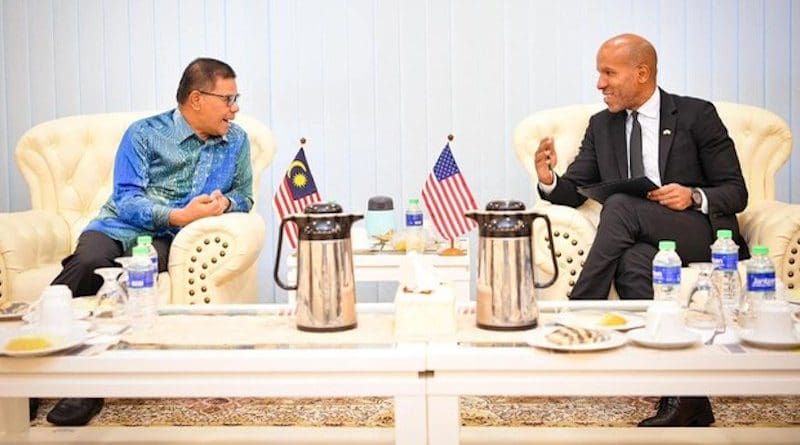Malaysia ‘Nicely’ Rebuffs US Over Sanctions Against Iran
By BenarNews
Malaysia said Thursday it “nicely” told visiting American officials that it would not kowtow to sanctions the United States or any other country imposes on Iran or elsewhere, for terror financing or other issues.
Malaysian Home Minister Saifuddin Nasution Ismail, during a meeting with U.S. Treasury officials in Kuala Lumpur, said his country was firm about combating terror funding. The officials were in town from Washington to discuss the issue of U.S.-sanctioned Iran allegedly using Malaysian entities to finance militant groups.
A little more than two months after the Palestinian militant group Hamas attacked Israel, killing around 1,100 people, the U.S., the Jewish state’s staunch ally, has focused on severing the money flow to groups such as Hamas and Hezbollah, which are backed and funded by Iran.
The Treasury officials’ visit to Malaysia and Singapore this week was part of that effort. And Brian Nelson, the visiting U.S. Treasury under secretary for Terrorism and Financial Intelligence, told a local news source, Malaysiakini, that there had been an increase in funds flowing to Iran and its so-called proxies – including Hamas – via the Malaysian financial system.
Iran has managed to keep selling its oil by secretive ship-to-ship transfers to disguise the petroleum’s provenance, thanks to countries that either don’t follow U.S. sanctions or look the other way when their waters are used for this activity.
The U.S. says Malaysia is one of those countries being used for oil transfers as well as fundraising for groups such as Hamas, which Kuala Lumpur supports, to Washington’s consternation.
Still, Malaysian Home Minister Saifuddin said he had a “good and cordial” meeting on Thursday morning with Nelson and his delegation, when they discussed what Washington calls the “illicit transfers” of Iranian oil off Malaysia.
“What I would like to highlight here first is, I managed to convey nicely to the U.S. delegates when it comes to the issue of sanctions, our position is that we only recognize sanctions imposed by the [United Nations] Security Council,” Saifuddin said.
“We don’t recognize any sanctions imposed by an individual country. The U.S. delegation respected our stance,” he said, when asked by reporters at an awards function.
Malaysia, a Muslim-majority country, has consistently advocated for a two-state solution as Israel has occupied the Palestinian territories of Gaza and the West Bank. And amid the latest crisis, with Israeli ground and air strikes killing more than 34,000 Palestinians in Gaza, Malaysia has denounced the Jewish state in no uncertain terms.
Malaysia has taken a stance supporting Iran, which launched drones and fired missiles at Israel on April 13. Prime Minister Anwar Ibrahimdescribed Iran’s actions as a “legitimate act” in response to Israel’s “barbarous” attack on Iran’s consulate in Damascus.
Saifuddin also said that the U.S. delegation had asked him about Malaysian efforts to combat terror funding.
“We reiterated Malaysia’s commitment [to counter terrorism financing] at the ASEAN and global level,” he said. Malaysia is scheduled to chair the Association of Southeast Asian Nations (ASEAN) next year.
“Malaysia is a country that upholds the rule of law, and we have clear legislation to manage the issues raised. … The U.S. delegations have taken note of this and they know precisely what are the steps taken by the Malaysian government on the issue of terrorism, extremism, and all those,” he added.
Still, Saifuddin said the Malaysian Home Ministry understood the U.S. Treasury’s concerns.
In December, the Treasury Department imposed sanctions on four Malaysia-based companies it accused of helping Iran’s production of drones. Washington accuses Iran of supplying deadly drones to what it says are terrorist proxies in the Middle East, and to Russia for use in Ukraine.
‘Environmental and safety risks’
Meanwhile, in an interview with local news site Malaysiakini, Treasury official Nelson said the main method that Iran used to raise money was through the sale of oil to buyers in East Asia, the Associated Press news agency reported.
“Many of these shipments traverse the waters around Malaysia and are loaded onto vessels of questionable legitimacy that may also pose major environmental and safety risks,” he said according to the report.
He also said the U.S. was trying to prevent Malaysia from becoming an area where Hamas could raise and transfer funds.
Earlier this week, on Monday, the U.S. envoy to Malaysia had said that the Southeast Asian government “understands the potential impact” of allowing the transshipment of U.S-sanctioned oil.
Envoy Edgard Kagan did not elaborate on what “potential impact” meant and it could refer to anything from sanctions on Malaysia to a sharp spike in oil revenue for Iran.
Shailaja Neelakantan in Washington and Minderjeet Kaur in Kuala Lumpur contributed to this report.

